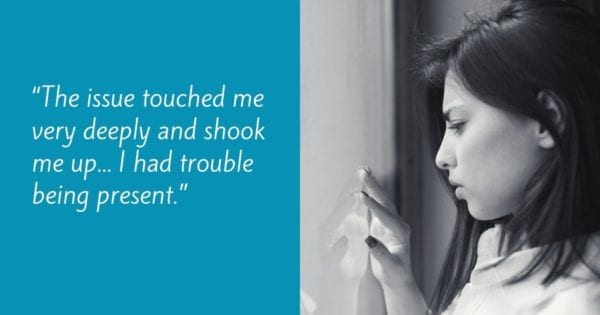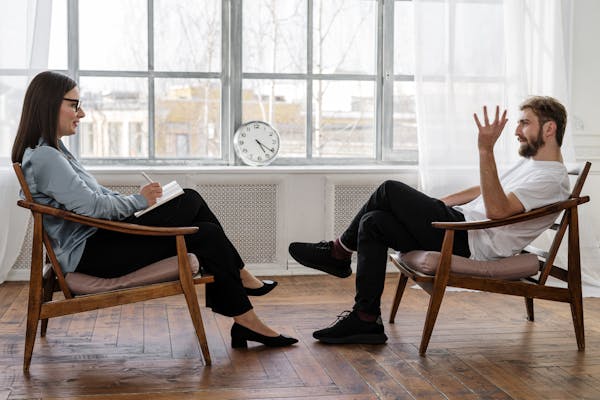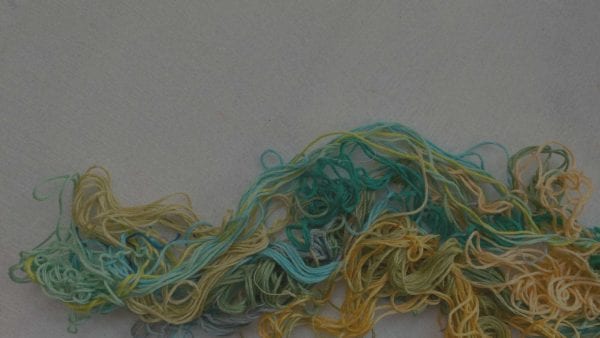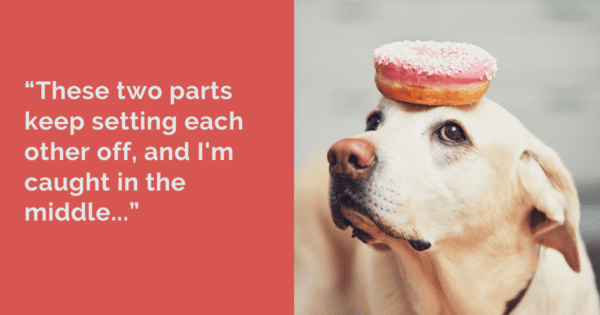“He will be appalled when he gets to know me better…”
A Reader writes:
“For quite some time, I have been aware of at least two parts: One is longing for a loving relationship and the other one wants to avoid getting to know someone because it is ashamed of very many things, e.g. my looks, way of life, etc. Practically everything.
“This part says: ‘He thinks I am great but I am not. He will be appalled when he gets to know me better.’ It wants to save me from the pain of being rejected instead of being loved. And this part is absolutely convinced that this will happen and it feels real terror as soon as I like someone. I have listened to it quite often but have not experienced any change, yet.
“Do you have an advice for this? This part seems to stem from my childhood (it showed me scenes from my childhood) but also seems to have been reinforced in recent years and there really is this intense emotional quality of being ashamed and wanting to run away and hide.
“P.S. I think a loving relationship is a human need so I am not really unbiased with regard to this subject but I do try not to press this part and I believe I am Self-in-Presence when I listen to it.”
Dear Reader:
This is a tough one! And I really appreciate how much you have done to make a safe inner space for this part of you to be heard… by not pressing it, by doing your best to listen as Self-in-Presence.
You say you have listened to it quite often but have not experienced any change yet.
So… I am wondering about what counts as “change.” If change means that you are in a fulfilling love relationship already, then no, that change hasn’t come yet. But have you perhaps experienced a “micro change”? That would happen if the part feels so understood by you, that you experience a sigh of relief moving through your body. That much change should have happened. And if it didn’t, it means that the listening-to-it needs to deepen and get more precise. (If it did, we can expect a series of those, in a number of sessions, to add up over time to bigger changes in action and belief.)
“I’m letting it know it can be the way it is for as long as it needs…”
Clearly this kind of part, that feels so deeply ashamed of who you are that it actually believes you cannot be loved, must spring from early trauma. Events that lead to the belief that we cannot be loved are traumatic events… since being loved is one of the most basic of human needs. Your whole body has known all along that something ‘wrong’ happened here.
The place where the wounding lives needs your company. It needs you to be Self-in-Presence: calm, centered, compassionate, steady, and warm. It needs you to say to it that it can be the way it is, as long as it needs to be… and you will be with it. Perhaps bringing to it a gentle hand will emphasize the tender quality of your company.
From there, I’d recommend sensing and describing exactly how it feels. Let it be as it is, and sense how it is. The more precise you can be in “getting” it, the likelier will be those deep whole-body breaths that signal that something needed has occurred.
Being the Self who can give compassion to this part for what it went through adds to your strength, resilience, and resourcefulness. And you can feel that, too.








Thank you to both am and Alison for your comments. I love Gendlin’s understanding that the body has always known what would have been right. For me that adds a whole deeper dimension to our work with trauma.
This post has released some tears for me. I think it is your acknowledgement of trauma and the total understanding and compassion that can be given to these parts of us that know what went wrong and what is right and what is needed. Thank you. The posts lately have been really speaking to me.
“Clearly this kind of part, that feels so deeply ashamed of who you are that it actually believes you cannot be loved, must spring from early trauma. Events that lead to the belief that we cannot be loved are traumatic events… since being loved is one of the most basic of human needs. Your whole body has known all along that something ‘wrong’ happened here.”
Thank you for this post today. I felt a shift while reading it. After reading his book, I’ve been using Eugene Gendlin’s Focusing method for several years and was recently introduced to your insightful book on
Focusing and to this blog.